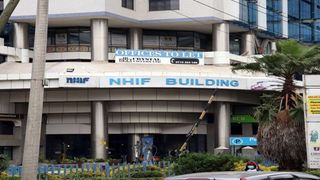
The National Hospital Insurance Fund (NHIF) building in Nairobi. The insurer has cut reimbursement for dialysis sessions by Sh3,000.
| Dennis Onsongo | Nation Media GroupNews
Premium
Private hospitals threaten to stop offering dialysis in NHIF pay row
What you need to know:
- The insurer plans to increase the frequency of dialysis sessions from the current two to three a week.
- The Kenya Association of Private Hospitals has said the move by NHIF is unfair to patients and hospitals.
Kidney specialists and patients who need dialysis have criticised the reduction by the national medical insurer of reimbursements from Sh9,500 to Sh6,500, as private hospitals say it will not be feasible to treat the patients.
The National Hospital Insurance Fund (NHIF) plans to increase the frequency of dialysis sessions from the current two to three a week to be in line with international standards, but has reduced the reimbursement by Sh3,000, which means patients will have to pay the difference.
The Kenya Association of Private Hospitals has said the move by NHIF is not only unfair to patients, but also to hospitals, which spend a lot of their resources in offering the specialised care.
Should this happen, many patients will suffer since majority of the dialysis centres are in the private sector -- 142 --, while there are only 54 public dialysis centres. Majority of the public centres are in Nairobi.
Dr Abdi Mohamed, of the association, said except for the machines, every item used in the dialysis procedure is for one-time use only, and some products, such as filters, are subjected to VAT, which makes the procedure expensive. Total costs including medication and food for the patients as well as immunity boosters come to no less than Sh8,000.
“We are dealing with blood, so we do not play games and even the machines have to be sterilised after every use.
There is also the issue of having a renal nurse because of the specialised nature of the procedure and they are not paid like the normal nurses. The costs are far too high and it is unfortunate the NHIF is making amendments to get more money yet it is cutting back the benefits, which reduces success for patients. Most private hospitals might stop doing it altogether,” he said.
Cost of dialysis
Dr John Ngigi, a consultant physician and kidney specialist who is also the president of the Kenya Renal Association (KRA), said the move will negate all gains in the renal sector because the concept of reimbursement has been a game changer for patients.
Reducing the reimbursement to Sh6,500 will see many patients drop out of treatment and many treatment units could close down.
“This is not feasible, even in public hospitals, and the cost of dialysis is not limited to just the machines. All consumables used throughout the entire process are discarded, which makes dialysis expensive, and those who want to make money will take shortcuts that may prove detrimental to the patients,” he said.
Mr John Gikonyo, who heads the Renal Patients Society of Kenya (RPSKe) and has a kidney condition expressed his dissatisfaction with the national insurer, stating that no consultations were done with patients or kidney specialists.
“This is not a well-thought out plan because we already have a situation whereby we do not get money for the three post-transplant drugs known as immunosuppression treatment, which costs Sh40,000 a month. We are also not covered for the pre-transplant evaluation, and here they come with these new amendments. Surely many of us will just die,” he said.
Mr Gikonyo, however, said the NHIF is right in adhering to international standard by increasing dialysis sessions to three.




